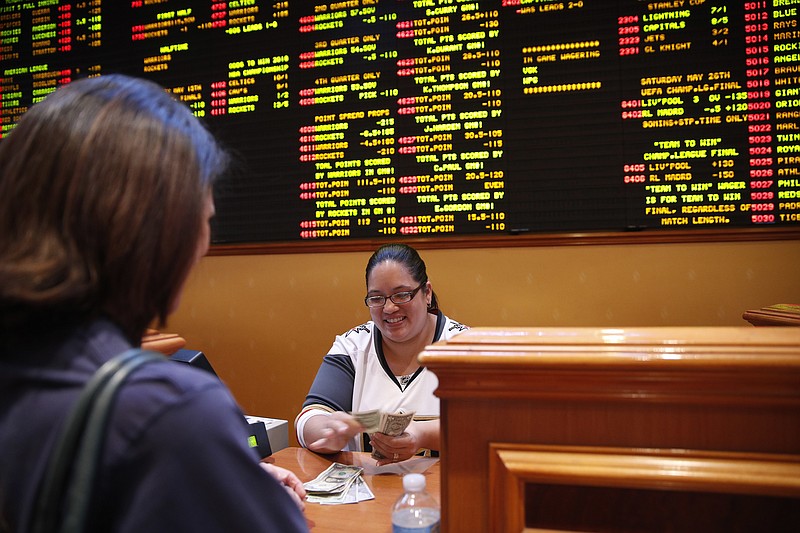Feb. 15, 1978, inside the University of Kentucky's Rupp Arena won't mean much to most college basketball fans. It was a cold, snow-covered Wednesday, not unlike most other winter days that year in the Bluegrass.
But what happened that night inside Rupp, with Kentucky about to snap a five-game losing streak to bitter rival Tennessee, and by double figures no less, should serve as a warning sign to all those who think legalized gambling on college athletic events couldn't dramatically change the atmosphere at those games.
Especially when one considers that Big Blue would be cutting down the nets from its fifth NCAA title and first in 20 years exactly 40 days later. Ahead by 19 points inside the final two minutes, UK coach Joe B. Hall emptied his bench. When the game ended, that 19-point cushion had shrunk to 13 points (90-77), and more than a smattering of boos - though well short of an avalanche - were directed Hall's way as the Wildcats left the court.
The reason for such displeasure: Kentucky was a 13.5-point favorite that night. Winning by 13 meant a betting loss for all those fans who had expected the Cats to cover the spread.
Forty years later, the star point guard on that team, three-time All-America selection Kyle Macy, understandably remembers little about that night.
"I was pretty naive about that stuff back then," he said this past week. "As long as we won, I was happy. I never had any idea what the line was. But I do remember Coach Hall really getting on our reserves after we lost a little bit of a lead late in one game. I guess it could have been that one.
"I just remember thinking, 'These guys give everything they have every day in practice, but Coach is really getting on them anyway.'"
Some of that was no doubt due to Hall's endless intensity. All he wanted was perfection, not unlike most championship coaches. But he also probably didn't like hearing the boos, however few, after whipping UT for the first time in more than two years.
And this was with sports gambling still illegal everywhere except Las Vegas. Whispered phone calls to a bookie. Numbers scribbled on a wadded-up piece of paper. Shady stuff all the way around, though the danger should always be front and center.
Those celebrating the Supreme Court's Monday ruling that struck down a 1992 federal law banning commercial sports betting in most states will say that ruling is a good thing, that legalizing the estimated $150 billion in illegal wagering on pro and college teams each year will benefit everyone, perhaps even the college athletes themselves.
But will it?
In much the same way most college students can buy a Powerball ticket at the neighborhood gas station or supermarket for every Wednesday and Saturday draw, if they can similarly bet on their own school to win or lose a football or basketball game, could their frustration on the outcome being different than their wager turn to anger at that game?
When it's no longer enough simply to win on the scoreboard, when the spread becomes as important as the W or the L, aren't we losing a crucial aspect of sportsmanship, if nothing else?
This isn't to say that legalizing it is altogether wrong, if only because theoretically it removes much of the underworld element from it. And maybe the expected revenue river will do more good than harm. Maybe, as so many state-run lotteries have, deserving high school students will earn college scholarship money. Let us hope.
Nor have most college coaches seemed overly concerned to this point about the ruling's unintended consequences.
"There is all this money out here, and the gambling is not going away," said current Kentucky basketball coach John Calipari on Friday. "It's there. Maybe everybody shares in it because it's going to happen anyway."
Tennessee athletic director and former football coach Phillip Fulmer took a more cautious approach, noting on Thursday: "Right now, we're looking at it and kind of see what, if any, consequences it has to college football as we go along."
Added Southeastern Conference commissioner Greg Sankey: "One of our first priorities is to ensure that we have thorough and effective systems in place to educate our student-athletes, coaches and other personnel on all issues associated with sports wagering."
Here's an issue: HIPAA laws. NFL teams disclose the likelihood of a player getting on the field, a huge nod to gamblers. College programs don't, under federal privacy laws. Will legalized wagering on college sports alter that?
As University of Tennesee at Chattanooga football coach Tom Arth, who played in the NFL, noted Friday with a slight laugh, "I love to know information on my opponents, but I don't want to give it out on my team. College athletics has always been very different than professional athletics in that way and others. This could change that dramatically."
Long after Macy's playing days ended following a lengthy NBA career, he became the head coach at Morehead State. As all NCAA coaches do, he spent at least one day a year discussing the perils of gambling, including point shaving.
"I would think you'd have to talk about that more now," he said.
Sadly, today's coaches may also have to talk about being booed after a win that was closer than the betting line. Ah, the joys of selling your soul for a fistful of dollars.
Contact Mark Wiedmer at mwiedmer@timesfreepress.com
